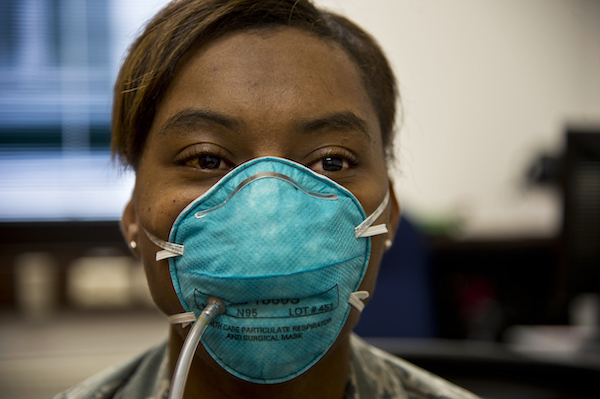The United States is a land of plenty, but federal officials say it does not have all the medical equipment it needs to fight the coronavirus. With the government estimating the U.S. needs anywhere from 270 million to 3.5 billion additional face masks, one would think its top priority would be facilitating the creation of new masks and finding ways to reuse its existing supply—but developments this weekend indicate otherwise.
The federal government initially recommended that healthcare providers wear N95 masks, which “protect the wearer from airborne particles and from liquid contaminating the face,” when interacting with any COVID-19 patient. The government later advised them to wear masks only for high-risk procedures, not because the threat had lessened, but due to the lack of available masks.
The N95 ventilators are intended to be used only once, but the supply is so limited that medical personnel have been reusing the same ventilators, potentially to the point of rendering them ineffective.
“I feel like I’m just going to end up using the same N95 mask, and eventually it’ll get so tattered I’ll get exposed,” one doctor told the Los Angeles Times.
As usual, the private sector came to the rescue. Some businesses have stepped up production to fill the gaping void. But when an Ohio-based nonprofit came up with a way to let doctors safely reuse the existing masks multiple times over, the FDA took its time to grant approval.
Battelle CEO Lou Von Thaer said it created a process “years ago” to clean N95 masks. Its Critical Care Decontamination System allows ventilators to be used up to 20 times. Each machine can clean 80,000 masks a day and return them the same day. Battelle tracks each mask, and those that have been used 20 times or that have defects are thrown away.
Battelle assembled two machines for use in Ohio and sent two to New York, one to Seattle, and one to the D.C. area. Together, the five machines could clean 400,000 masks a day for up to 20 uses.
That alone would reduce the number of single-use masks needed by 8 million.
“Innovation is really in Ohio’s DNA,” said Ohio Governor Mike DeWine. “This Ohio-driven solution has the potential to save lives now and in the future across the United States,” said Lt. Governor Jon Husted.
Unfortunately, speed and efficiency are not part of the government’s DNA. The federal government delayed its response, then imposed a regulation that would have cut the machines’ effectiveness by 88 percent.
“We’ve been pushing this for a week,” said Husted at an impromptu press conference on Sunday, designed to prod the government into action.
The machines are “ready to move, but we’ve been waiting on FDA approval,” said DeWine. “We have been waiting, and waiting, and waiting.”
Husted said the FDA had promised him an answer by the end of last week.
Ultimately, the FDA called Husted at 1:19 a.m. on Sunday, saying it had granted approval—but only if Battelle limited the machines to cleaning 10,000 masks a day.
The FDA offered no reason for the limitation. Furthermore, it’s clear the government intended to constrict the life-saving technology for weeks or months. A letter from FDA Chief Scientist Denise Hinton instructed, “Battelle shall provide FDA weekly reports, including data according to a testing plan for scale-up reviewed by FDA.”
The response seemed counterintuitive: If the technology is safe for 10,000 masks a day, why not 80,000? If the technology is unsafe, why allow any use at all?
To confound things further, the FDA order acknowledges, “There is no adequate, approved, and available alternative to the emergency use of the Battelle Decontamination System for decontaminating compatible N95 respirators for reuse.”
DeWine contacted President Donald Trump, who publicly urged FDA approval. “Our medical personnel desperately need this,” said DeWine. “Lives are literally at stake.”
After the president’s intervention, FDA officials “compressed what would normally take a number of days … into a couple of hours,” DeWine said during his Monday afternoon press conference.
The government rewarded its response with a bout of self-congratulation. “This is an example of everyone working quickly to help find a solution,” said FDA Commissioner Stephan Hahn.
That’s not the most obvious assessment of the government’s handling of the situation.
It should not take a call from the president to expedite FDA approval of vital technology that serves a manifest public health need.
The private sector is moving faster than government can keep up. Innovation is part of the free market’s DNA. The world would be safer if it were the watchword for the government, as well.
(Photo credit: U.S. Air Force / Staff Sgt. Sara Keller. Public domain.)

